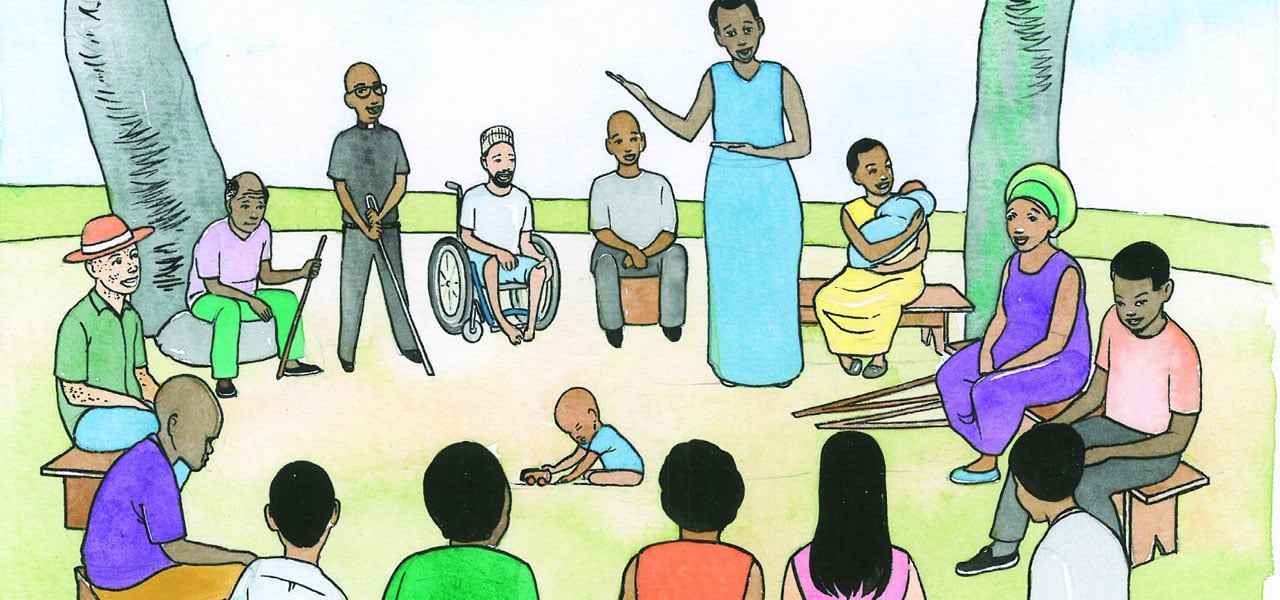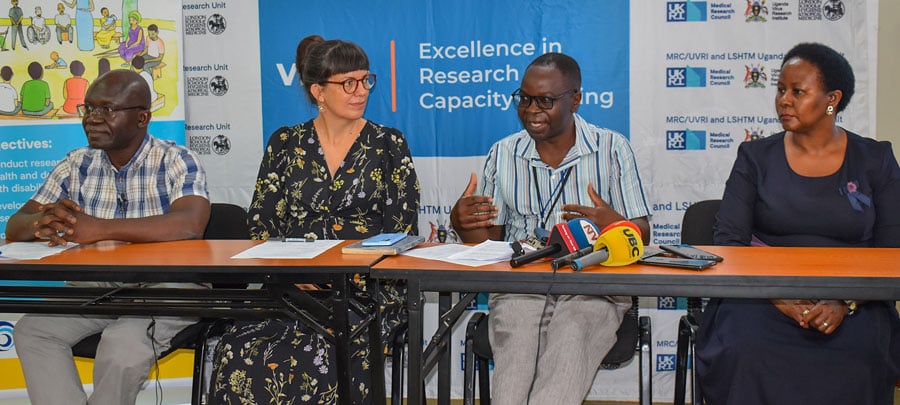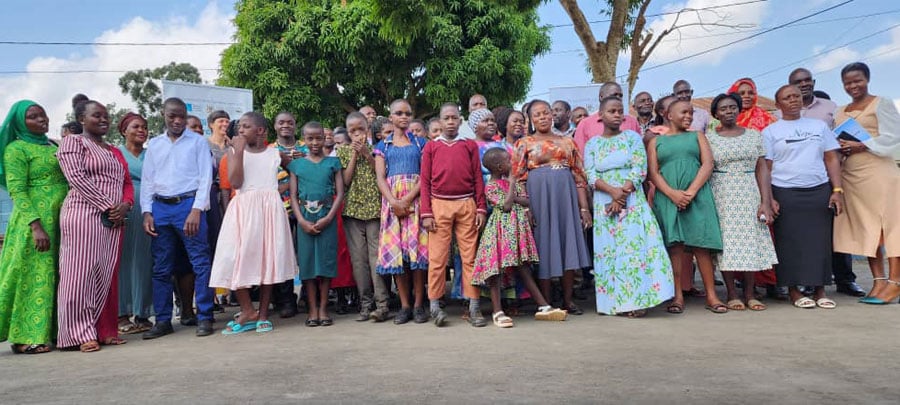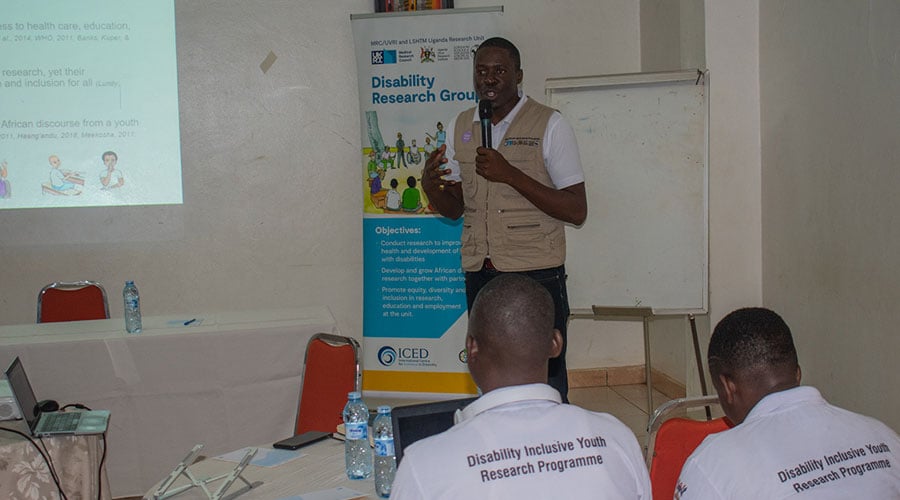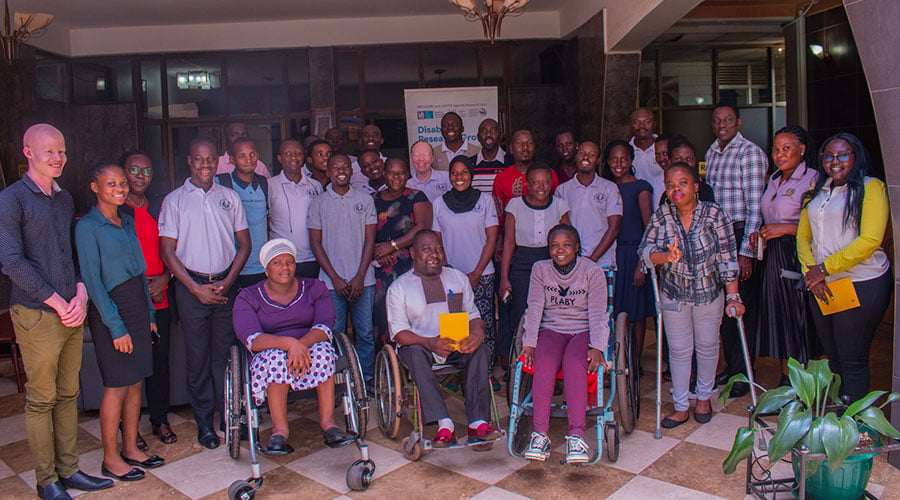The Disability Research Group (DRG) at the MRC/UVRI & LSHTM Uganda Research Unit conducts research to improve the health, development and quality of life of people with disabilities in East Africa.
The DRG objectives are:
- conducting research on interventions to enhance the health, development, and quality of life of persons with disabilities in Africa;
- establishing an inclusive disability research centre in East Africa by empowering researchers with disabilities and fostering partnerships with research institutions and disability organizations across the continent;
- advocating for equity, diversity, and inclusion in research, education, and employment within the unit, particularly emphasizing disability inclusion.
Aligned with the UN Convention on the Rights of Persons with Disabilities and Sustainable Development Goals, our emphasis lies on ensuring equitable access to health, education, employment, and social participation, as well as involving persons with disabilities in research. Employing Afrocentric and participatory methodologies, we develop culturally appropriate and inclusive interventions, influence policy, and contribute to decolonizing disability research in East Africa.
The DRG is nested in the Non Communicable Diseases Theme at the the MRC/UVRI & LSHTM Uganda Research Unit and collaborates closely with the International Centre for Evidence in Disability (ICED) at LSHTM. We partner with academic institutions, disability organizations, service providers, civil society, and relevant government departments in the region. We are members of the African Network for Evidence-to-Action in Disability (AfriNEAD).
The Disability Research Group is led by Dr Femke Bannink Mbazzi and Dr Andrew Ssemata. It consists of 12 research staff members, a group of youth co-researchers with disabilities and East African PhD students. The DRG works with Adult and Youth Advisory Groups of Persons with Disabilities, and partners with organizations of persons with disabilities, relevant government departments and non-governmental organizations in the region.
- Disabled Youth Investigates
This AHRC funded qualitative capacity-building project aims to improve the participation and inclusion of youth with disabilities in research. Youth with disabilities and their peers are trained in research and mentored to conduct research at the MRC/UVRI & LSHTM Uganda Research Unit and Makerere University. This project is implemented in partnership with the Child Health and Development Centre at Makerere University, the National Council for Persons with Disabilities and the THRU Zimbabwe Health Unit’s Youth Research Academy.
The project adapted the Youth Research Academy manual from Zimbabwe through co-creative meetings with key stakeholders and youth advisors. Youth researchers received a 10-day qualitative research training on disability studies, data collection methods, data transcription, coding, analysis, GDPR, GCP, and fieldwork. To foster contextual learning and capacity building, youth participants were attached to existing research teams and project for a period of 3-months as interns. Each youth had a mentor and also received support from the research team. Each youth was paired with a peer to work together during the internship and later in the field research they conducted. Evaluations were conducted about the training sessions and the internships involving youth researchers. The youth researchers co-produced a participatory film on the capacity building project highlighting how to make inclusive research work relationships.
- The Mission Billion
In this NIHR funded project, led by Prof Hannah Kuper from ICED and Dr Femke Bannink Mbazzi from the Disability Research Group in Uganda, we test if community based participatory groups can improve access to health care for people with disabilities in Luuka district in Eastern Uganda. This study is implemented together with organisations of persons with disabilities, Makerere University and AMREF. It is part of the larger Missing Billion Initiative to improve health and quality of life of persons with disabilities globally.
- The Baby Ubuntu programme
The Baby Ubuntu programme of early care and support for young children with developmental disability and their families funded by Saving Brains, Grand Challenges Canada and the Tropical Health Education Trust, is an early childhood intervention which aims to improve health and well-being of children with developmental disabilities and their caregivers. The programme has developed training manuals for caregivers and health care workers.
- Evidence based inclusive education for children with disabilities in primary schools Uganda: Obuntu Bulamu, a peer-to-peer support intervention for inclusion
Funded by FWO, VLIR-UOS, Atlas Alliance and FIRAH, this randomized controlled trial aims to improve inclusion and quality of life of children with disabilities at home and in school through the Obuntu bulamu intervention. The co-created intervention emphasizes indigenous values of reciprocity and mutual responsibility and builds peer support networks amongst children, families and schools. The intervention was co-created with the study participants. See the training manuals and film narratives at the below links:
Implementing partners include parents groups for children with disabilities SHYNEA, Kyambogo University and Ghent University.
- NAVIGENDI: Navigating the challenges of violence, gender, and disability
This ESRC funded mixed method longitudinal study with young people with disabilities in Uganda closely follows a cohort of children with disabilities over a period of 3 year to create in-depth understanding of violence and violence prevention. This Disability Research Group implements this study in collaboration with Prof Jenny Parkes and Prof Colleen Howell from University College London, Raising Voices Uganda and the National Union for Persons with Disabilities of Uganda.
- Improving Kidney Saving - and Continence Management Services for Children with Spina Bifida in Uganda
This Child-Help International and Bo-Hjelt Foundation funded project aims to improve quality of life of children with spina bifida through development of an improved continence management intervention in Uganda. This study is implemented in partnership with CURE Hospital, Katalemwa Cheshire Home, Our Useful Rehabilitation Services, AVSI Foundation and House of Hope, and the Spina Bifida and Hydrocephalus Association of Uganda.
- Young Africa Works: Disability Inclusion Research Partnership
This research, with Prof Tom Shakespeare and Dr Sarah Polack from ICED as PI’s, aimed to explore the experiences of young people with disabilities and the individual, social and policy level factors influencing access to education and employment in Uganda and six other countries in Africa (Rwanda, Ethiopia, Senegal, Ghana, Kenya, Nigeria). The East African research hub for this project was led by Dr Femke Bannink Mbazzi and Dr Agnes Ssali from the DRG. Read the reports.
View the participatory film describing experiences of youth in Uganda and Ghana.
Publications
- 2024
- Smythe, T., Ssemata, A. S., Slivesteri, S., Bannink Mbazzi, F., & Kuper, H. (2024). Co-development of a training programme on disability for healthcare workers in Uganda. BMC health services research, 24(1), 418. https://doi.org/10.1186/s12913-024-10918-z
- Bannink Mbazzi, F., Kawesa, E., Nalugya, R., & Seeley, J. (2024). The ‘Obuntu bulamu’ visual narratives: participatory research and film making about inclusion of children with disabilities in Uganda. Journal of Participatory Research Methods, in press.
- Nimusiima, C., Kawesa, E. S., Seeley, J. & Bannink Mbazzi, F. (2024). Adaptation and validation of the child and family follow-up survey (CFFS) tool to measure participation of children with disabilities in Uganda. African Journal of Social Work, 20-30 https://dx.doi.org/10.4314/ajsw.v14i1.3
- Tumukunde, V., Medvedev, M. M., Tann, C. J., Mambule, I., Pitt, C., Opondo, C., et al (2024) OMWaNA Collaborative Authorship Group. (2024). Effectiveness of kangaroo mother care before clinical stabilisation versus standard care among neonates at five hospitals in Uganda (OMWaNA): a parallel-group, individually randomised controlled trial and economic evaluation.. Lancet (London, England), S0140-6736(24)00064. doi:10.1016/S0140-6736(24)00064-3
- Smythe, T., Scherer, N., Nanyunja, C.,Tann, C. J., & Olusanya, B. O. (2024). Strategies for addressing the needs of children with or at risk of developmental disabilities in early childhood by 2030: a systematic umbrella review.. BMC medicine, 22(1), 51. doi:10.1186/s12916-024-03265-7
- 2023
- Bannink Mbazzi, F., Kawesa, E., Nimusiima, C., Nalugya, R., van Hove, G., & Seeley, J. (2023). ‘We Have to Try and Teach Them from Home’ – Parents’ Perspectives on Education of Children with Disabilities During the First Year of the COVID-19 Outbreak in Uganda. International Journal of Disability Development and Education, 1-18. 10.1080/1034912x.2023.2279788
- Kuper, H., Ssemata, A. S., Smythe, T., Drazdzewska, J., Waiswa, P., Kagurusi, P., Rosato, M., & Bannink Mbazzi, F. (2023). Is it feasible to implement a community-based participatory group programme to address issues of access to healthcare for people with disabilities in Luuka district Uganda? A study protocol for a mixed-methods pilot study. BMJ open, 13(9), e074217. https://doi.org/10.1136/bmjopen-2023-074217
- Nalugya, R., Nambejja, H., Nimusiima, C., Kawesa, E. S., van Hove, G., Seeley, J., & Bannink Mbazzi, F. (2023). Obuntu bulamu: Parental peer-to-peer support for inclusion of children with disabilities in Central Uganda. African Journal of Disability, 12. doi:10.4102/ajod.v12i0.948.
- Bannink Mbazzi, F., King, R. & J. Seeley (2023) ‘Dimensions of Vulnerability. Case 8.3: Studying the Impact of COVID-19 on Vulnerable Populations’. Page 165/166. Research Ethics in Epidemics and Pandemics: A Casebook. Eds. Susan Bull & Michael Parker. Oxford: Wellcome Centre for Ethics. https://link.springer.com/book/10.1007/978-3-031-41804-4
- Bannink Mbazzi, F. (2023). Translating the Ubuntu philosophy into practical disability inclusive interventions. In Ubuntu Philosophy and Disabilities in Sub-Saharan Africa (pp. 148-162). Routledge. doi:10.4324/9781003343684-9
- Sturrock, S., Sadoo, S., Nanyunja, C., & Le Doare, K. (2023). Improving the Treatment of Neonatal Sepsis in Resource-Limited Settings: Gaps and Recommendations.. Research and reports in tropical medicine, 14, 121-134. doi:10.2147/RRTM.S410785
- Medvedev MM, Tumukunde V, Kirabo-Nagemi C, Greco G, Mambule I, Katumba K, et al. Process and costs for readiness to safely implement immediate kangaroo mother care: a mixed methods evaluation from the OMWaNA trial at five hospitals in Uganda. BMC health services research. 2023;23(1):613
- 2022
- Bannink Mbazzi, F. & Kawesa, E. (2022) ‘Impairments of the brain’ – Global South perspectives on childhood neurodevelopmental disabilities. Special issue on Ethics & Neurodevelopmental Disorders in Developmental Medicine and Child Neurology, https://onlinelibrary.wiley.com/doi/full/10.1111/dmcn.15253.
- Nanyunja, C., Sadoo, S., Kohli-Lynch, M., Nalugya, R., Nyonyintono, J., Muhumuza, A., et al (2022). Early care and support for young children with developmental disabilities and their caregivers in Uganda: The Baby Ubuntu feasibility trial.. Front Pediatr, 10, 981976. doi: 10.3389/fped.2022.981976
- Nanyunja, C., Sadoo, S., Mambule, I., Mathieson, S. R., Nyirenda, M., Webb, E. L., et al. (2022). Protocol for the Birth Asphyxia in African Newborns (Baby BRAiN) Study: a Neonatal Encephalopathy Feasibility Cohort Study.. Gates open research, 6, 10. doi:10.12688/gatesopenres.13557.1
- 2021
- Tann, C. J., Kohli-Lynch, M., Nalugya, R., Sadoo, S., Martin, K., Lassman, R., et al. (2021). Surviving and thriving: early intervention for neonatal survivors with developmental disability in Uganda. Infants and Young Children, 34(1), 17. http://doi.org/10.1097/IYC.0000000000000182.
- Bannink Mbazzi, F., Nimusiima, C., Nalugya, R., Kawesa, E., King, R., Van Hove, G., Seeley, J. (2021) The impact of COVID-19 measures on children with disabilities and their families in Uganda. Disability & Society, online, http://doi.org/10.1080/09687599.2020.1867075.
- Tann, C. J., M. Kohli-Lynch, R. Nalugya, S. Sadoo, K. Martin, R. Lassman, C. Nanyunja, M. Musoke, M. Sewagaba, M. Nampijja, J. Seeley and E Webb. (2021). "Surviving and Thriving: Early Intervention for Neonatal Survivors With Developmental Disability in Uganda." Infants and Young Children 34(1): 17-32. http://doi.org/10.1097/IYC.0000000000000182.
- Bannink Mbazzi, F., Nimusiima, C., Akellot, D., Kawesa, E., Abaasa, A., Hodges, A., Seeley, J., Vervoort, T. (2021) Use of Virtual Reality Distraction to Reduce Child Pain and Fear during Painful Medical Procedures in Children with Physical Disabilities in Uganda: A feasibility study, Pain Medicine, pnab206, https://doi.org/10.1093/pm/pnab206.
- 2020
- Bannink Mbazzi, F., Nalugya, R. Kawesa, E., Nambejja, H., Nizeyimana, P., Ojok, P., van Hove, G., and Seeley, J. (2020) ‘Obuntu bulamu’ – development of an indigenous model for disability inclusion in Uganda. Scandinavian Journal of Disability Research, 22(1), pp. 403–416. https://doi.org/10.16993/sjdr.697
- Bannink Mbazzi, F., Nalugya, R., van Hove, G. (2020) ‘They give him a chance’- Parents’ perspectives on disability and inclusive primary education in Uganda. International Journal of Disability, Development and Education, 10.1080/1034912x.2019.1593326
- Tann, C. J., Kohli-Lynch, M., Nalugya, R., Sadoo, S., Martin, K., Lassman, R. et al. (2020). Surviving and Thriving: Early Intervention for Neonatal Survivors With Developmental Disability in Uganda.. Infants & Young Children, 34(1), 17-32. doi:10.1097/IYC.0000000000000182
- Medvedev MM, Tumukunde V, Mambule I, Tann CJ, Waiswa P, Canter RR, et al. Operationalising kangaroo Mother care before stabilisation amongst low birth Weight Neonates in Africa (OMWaNA): protocol for a randomised controlled trial to examine mortality impact in Uganda. Trials. 2020;21:1-19.
Presentations
- DIY Study dissemination, 4 June 2024
- The Wake-Up Call with King of Radio Wesley ft Naume Adong and Sande Silvester from MRC, 4 June 2024
- Sande Slivesteri Presentation at the World Disability and Rehabilitation Conference 2023
- Obuntu Bulamu: Inclusive Education
- Obuntu Bulamu Libende Boyz
Social
- Twitter: @obuntu_bulamu
The Disabled Youth Investigates (DIY) Study leads together with the youth researchers held a press conference at the MRC/UVRI & LSHTM Uganda Research Unit in Entebbe to share research findings. Several media houses including NTV, UBC TV, NBS, CBS Radio, Monitor, New Vision and socio-media influencers attended the press conference.
Links to media coverage:
- Abavubuka abaliiko obulemu babanguddwa mu mirimu egyenjawulo
- Breaking barriers in research
- Youths with disabilities empowered to conduct research
- Ugandan Youth with Disabilities Lead Inclusive Research Initiative
- The peer to peer support and mentoring model effectively trained youth with disabilities in research skills, increased their employment prospects and raised awareness about the value of inclusive research
The Obuntu Bulamu study shared research findings with participants and stakeholders in Masaka district on June 8 and Wakiso district on June 15. The intervention improved classroom inclusion of children with disabilities and their peers in primary schools in Central Uganda.
Our youth researchers share the Disabled Youth Investigates study results and raise awareness on the importance of including youth with disabilities in research at Rest TV.
Watch the video.
Our DIY Youth Researchers & FriendsF4R hosted a community workshop themed "challenging outdated ideologies on disability & special educational needs."
Political leaders, researchers, and youth with disabilities from North Charleston Police and Show Abilities Uganda attended.
Our Disability Inclusive Youth (DIY) researchers are presenting about our co-collaborative research at the FriendsF4R (Fighting 4 Rights) global event in UK today.
The Disabled Youth Investigates project is a qualitative action research study focused on capacity building for youth with disabilities in research.
From June 19th – 23rd, Dr Mandi Tembo joined the MRC/UVRI and LSHTM Uganda Research Unit to facilitate the DIsability Inclusive Youth (DIY) Research Programme 2023.
Find out more about the programme.
The Obuntu Bulamu research project aims to improve participation, inclusion, and quality of life of children with disabilities. The project is funded by the Norwegian Agency for Development Cooperation (Norad), Atlas Alliance, International Foundation of Applied Disability Research (FIRAH) and Child-Help.
Partners
- International Centre for Evidence in Disability (ICED) at LSHTM
- Child Health and Development Centre, Makerere University
- African Network for Evidence-to-Action in Disability (AfriNEAD)
- National Council for Persons with Disabilities, Uganda
- The Missing Billion Initiative
- Kyambogo University, Uganda
- Ghent University, Belgium
- Stellenbosch University
- The Health Research Unit Zim (THRU ZIM)
- National Union of Disabled Persons of Uganda (NUDIPU)
- The Uganda National Action on Physical Disability (UNAPD)
- Uganda National Association of the Deaf (UNAD)
- Light for the World, Uganda
- Amref Health Africa
- CoRSU Rehabilitation Hospital
- Kyanninga Child Development Centre
- National Association of Cerebral Palsy
- Uganda National Association of the Blind (UNAB)
- SHYNEA-UGANDA
- Spina Bifida and Hydrocephalus Association of Uganda
- The Uganda Association of Down Syndrome
Funders
- National Institute for Health and Care Research (NIHR)
- Child-Help International
- Bo-Hjelt Foundation
- UKRI Economic and Social Research Council (ESRC)
- NORAD / Atlas Alliance
- International Foundation of Applied Disability Research (FIRAH)
- Saving Brains
- Grand Challenges Canada
- The Tropical Health Education Trust
- UKRI Arts and Humanities Research Council
- Mastercard Foundation
- The Seneca Trust
- Cerebral Palsy Alliance
